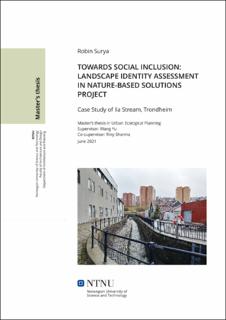| dc.description.abstract | As the world was getting urbanized and climate change was happening, sustainable development in urban areas had gained its importance. Then the concept of Nature-based Solutions (NBS) emerged as an attempt to address the challenges of fighting climate change while simultaneously was expected to fight social, economic, and ecological problems. However, the concept was not out of criticisms. One is about social inclusion.
In this study, I examine social inclusion in NBS. The research was driven from the question of “to what degree NBS is socially inclusive?”. Framework on Landscape Identity is seen as a potential framework to measure social inclusion. Thus the theory on Landscape Identity is used. The research is using the Covid-19 pandemic situation as a force to try to have a flexible methodology. Mix approach of qualitative and quantitative is used depending on the data gathering method. The primary method of data gathering is walking interviews, supported by other desk-based methods. A combination of those methods has made the research found that a socially inclusive community is not the product of NBS, nor NBS is the product from an inclusive community. Instead, the two needs to be developed simultaneously since the early beginning of the project. | |
